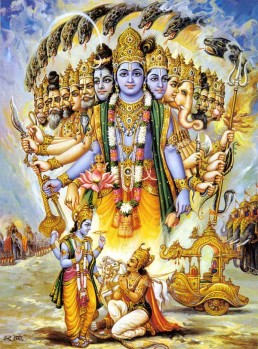Swami Chinmayananda
Swami Chinmayananda Commentary
Vyasa’s dramatic genius will not fail to seek its fulfilment whenever an occasion arises. Here is an artistic example of such fine brush-work, accomplished by Vyasa with words, on the canvas of the Geeta. Arjuna’s emotional agitations are dramatically indicated here when the Lord says, “BE NOT AFRAID, NOR BEWILDERED, HAVING SEEN THIS FORM OF MINE, SO TERRIBLE.”Krishna consoles his friend Arjuna by words and actions and helps him to be in a state of reassuring joys. The Lord comes back to His original form and announces His entry into it with the words: “NOW SEE AGAIN THIS, MY FORMER-FORM.”This passage, which announces the return of the Lord into His “gentler attitude” and “loving form,” should remind all Vedantic students of at least one of the great Mahavakyas. The identity between the Universal-Form, the Terrible-Totality and the gentle Form-of-Krishna, the Divine-individual, is beautifully brought about by the term
“THIS MY FORMER-FORM.” In fact, the microcosmic representation of Truth smiling temporarily from an assumed mortal-form of Krishna, is Itself the macrocosmic Universal-Form, wherein He expresses Himself as the Essence in all forms and names. The wave is in essence, the ocean; and if the ocean is mighty and fierce, terrible and gigantic, the wave itself is tame and bashful, lovable and attractive.
THE SCENE AGAIN SHIFTS FROM KURUKSHETRA AND THE WAR-FRONT TO THE QUIET CHAMBERS OF THE LUXURIOUS PALACE IN HASTINAPURA, WHERE THE BLIND OLD DHRITARASHTRA IS LISTENING TO THE RUNNING COMMENTARY GIVEN BY HIS MINISTER, SANJAYA:
Adi Sankara Commentary
Ma te vyatha, may you have no fear; and ma vimudha-bhavah, may not there be bewilderment of the mind; drstva, by seeing, perceiving; idam, this rupam, form; mama, of Mine; idrk ghoram, so terrible, as was revealed. Vyapetabhih, becoming free from fear; and becoming prita-manah, gladdened in mind; punah, again; prapasya, see; idam, this; eva, very; tat, earlier; rupam, form; me, of Mine, with four hands, holding a conch, a discus and a mace, which is dear to you.
The Bhagavad Gita with the commentary of Sri Sankaracharya – Translated by Alladi Mahadeva Sastry
Holy Geeta – Commentary by Swami Chinmayananda
The Bhagavad Gita by Eknath Easwaran – Best selling translation of the Bhagavad Gita
The Bhagavad Gita – Translation and Commentary by Swami Sivananda
Bhagavad Gita – Translation and Commentary by Bhaktivedanta Swami Prabupadha
Srimad Bhagavad Gita Chapter 11 – Verse 49 – 11.49 ma te vyatha – All Bhagavad Gita (Geeta) Verses in Sanskrit, English, Transliteration, Word Meaning, Translation, Audio, Shankara Bhashya, Adi Sankaracharya Commentary and Links to Videos by Swami Chinmayananda and others – 11-49

